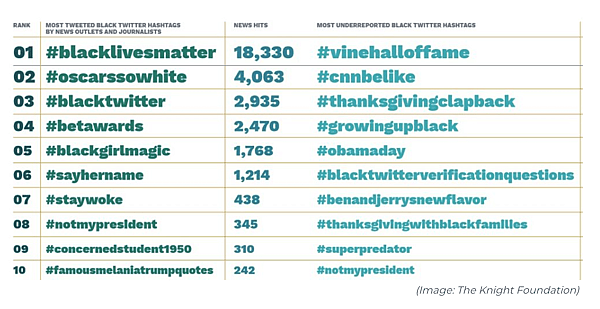It’s been clear for quite some time that Black Twitter is a dominant, if not disruptive, social media force and now the data is here to back that notion up.
Tuesday, the John S. and James L. Knight Foundation released findings from the largest study ever conducted on interactions between the mainstream news media and Black Twitter. The study also went the extra step of analyzing other internet subculture’s such as “Feminist Twitter” and “Asian American Twitter.”
According to the report, what we’ve always suspected is true; marginalized communities do indeed flock to Twitter to shape and regain control of their community’s narratives before turning to their local and cable news stations. Not only has the media taken notice, but the press has now started turning to Black Twitter to get leads on what’s hot, relevant or about to become the newest hashtag du jour.
The Knight Foundation interviewed 45 prominent Twitter users and journalists to get firsthand accounts on how the media and these communities interact, then analyzed 44,620,175 tweets with community-related hashtags during 2015 and 2016.
Despite the enormous impact that Black Twitter has on the mainstream, many of its most prominent voices noted that it very rarely gets much respect or credit.
“This sense of exclusion is one reason for the development of independent online community spaces in the first place,” the report reads. And that general distrust of traditional media is why these subcultures continue to thrive.

Who makes up Black Twitter?
The report defines those who make up Black Twitter as people who:
-Are concerned that reporters overrely on Twitter for sourcing, and raise ethical concerns about surveillance.
-Express a desire for news professionals to cultivate authenticity by showing up as a “real person” online.
-Want journalists to cover the plurality of black communities with diverse voices, stressing that “black people are not a monolith.”
According to The Knight Foundation key findings include:
- Twitter subcultures give voice to issues that mainstream media don’t cover: Participants often use Twitter to share and raise awareness about issues of concern on their own terms without waiting for journalists to take interest.
- Community members express low levels of trust in the media: A favorability analysis of 23 major news outlets showed that participants were twice as likely to express a negative view of a news outlet as a positive view. They also criticized and censured news media outlets more often than praising and endorsing them. However, the most criticized outlets were usually also the most shared.
- Media critique often relates to how issues are framed: Media criticism is generally directed not at fake news but at what is perceived as harmful framing by the media; participants are not so much disputing the basic facts as asking why certain facts are being emphasized at the expense of others.
- Participants bypass mainstream media as a news source: Some community members use Twitter as a curated news source to avoid problematic portrayals by mainstream media outlets.
- Media rely on Twitter subcultures as a source of news: Journalists view Twitter as a highly productive tool for gathering story ideas and insights.
- Participants are concerned about story mining by journalists: Active participants did not like having their tweets harvested by journalists for stories without permission, citing two major concerns: lack of control over intellectual property and the potential for online harassment.
- Engagement doesn’t equal favorability: The number of times a story is shared on social media is often seen as an endorsement by news organizations, and shares are important metrics for news impact. However, the analysis revealed that popularity in terms of share counts does not necessarily mean approval or trust. BuzzFeed, The Washington Post, The New York Times, HuffPost and CNN—were among the top 10 most shared outlets across all three communities. Of these, only one – BuzzFeed – had a favorability score above zero.
- Participants tend to share news content that covers their community’s high-visibility Twitter activities: The data revealed feedback loops in which participants created compelling Twitter content, media outlets covered it, and the community then circulated the media coverage of its own content.
Not surprisingly the most popular Black Twitter hashtag for the press so far has been #BlackLivesMatter.
“A strong future for journalism is dependent on accurate reporting that reflects the stories and concerns of all of our communities,” LaSharah Bunting, Knight Foundation director for journalism, said in a press release.
“The report offers a window into how some of these communities interact with the news on their own terms, opening an opportunity for journalists to connect with their audiences in new and different ways.”

